Veterinary researchers have found that dogs’ eyes are quite similar to ours. The likeness is so keen that the Glaucoma Research Foundation has funded a study run by veterinary scientists to map the genes of blind dogs. The scientists believe by studying these genes that they can better understand the two most common causes of blindness — glaucomaand retinitis pigmentosa.
The research began a decade ago when Andras Komaromy, a professor and researcher at Michigan State University’s College of Veterinary Medicine received a call from a dog breeder who was concerned about seeing a number of dogs go blind from a retinal disease.
Komaromy tells CNN, “I drove more than 500 miles from Philadelphia to Michigan to examine the affected dogs.”
All of the dogs he observed were the same breed — Swedish Vallhunds. The breeder told Komaromy that Scandinavian veterinarians started seeing the disease in late 1990s.
Swedish Vallhunds are not that common and the breed almost died out during World War II. Komaromy searched for other researchers to compare research. He found Hannes Lohi and Paivi Vanhapelto doing similar research in Finland.
They collaborated and contacted veterinarians in seven countries on three continents to examine 324 dogs. They tested blood samples from these animals, and found the breed shared a mutational defect on a gene designated as MERTK (c-mer proto-oncogene tyrosine kinase). They published their study in the peer reviewed journal PLOS One.
Their research showed the gene in humans and in dogs is already associated with incurable retinal blindness. The good news is by marking the gene, breeders can avoid spreading this hereditary disease.
Komaromy and his colleagues are hoping to develop a treatment to inhibit the mutated gene to spread in dogs and in humans. “Canine retinal disease models contribute significantly to our understanding of retinal disease mechanisms and the development of new therapies for human patients,” Komaromy says.
Human glaucoma affects roughly 66 million people worldwide, and is caused by multiple factors.
Source: CNN, Michigan State University College of Veterinary Medicine, PLOS One









